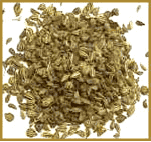 Ajwain probably originated in Egypt and the eastern Mediterranean area. It is very widely cultivated in black soil particularly along the riverbank in Egypt and many other countries like India, Iran and Afghanistan.
Ajwain probably originated in Egypt and the eastern Mediterranean area. It is very widely cultivated in black soil particularly along the riverbank in Egypt and many other countries like India, Iran and Afghanistan. Ajwain is a very old and well known Ayurvedic spice. According to Hakeem Hashmi, the oriental unani researcher, the ajwain seeds combine the powerful and stimulant qualities of capsicum, bitter property of chiretta and anti spasmodic qualities of asafoetida. Ajwain has been used as a carminative medicine from the ancient times. Famous Greek physician like, Dioscrides and Gelen used it in various medications. Some very valuable unani medicines are prepared from ajwain seeds.
Ajwain is called omam in the southern part of India. Omam (ajwain) water that is the water distilled from the seeds in an excellent carminative that cures flatulence, indigestion & low appetite. This water is a household medicine not only in south India but also in Srilanka, Malaysia and even in some Arabian countries
The part used of the plant is the seeds or fruit. It looks like cumin or caraway seeds, however, it has a bitter taste like thyme only stronger. The seeds are small, gray-green in color and quite peppery when raw, but milder when cooked.
Ajwain is a small, erect, annual shrub with soft fine hairs. It has many branches of leafy stems, small feather like leaves, 4 to 12 rays of flower heads, each bearing 6 to 16 flowers. The fruits are minute, egg shaped and grayish.
Main constituents include an essential oil called thymol which constitutes 35-60% of The essential oil (2.5 to 5% in the dried fruits).There is also α-pinene, p-cymene, limonene and γ-terpinene found in the seed.
Ajwain seeds consist of moisture, protein, fat, minerals, fiber, carbohydrates, calcium, phosphorus, iron, carotene, thiamin, riboflavin and niacin.
Ajwain seeds consist of moisture, protein, fat, minerals, fiber, carbohydrates, calcium, phosphorus, iron, carotene, thiamin, riboflavin and niacin.
the oil of ajwain is an almost colourless to brownish liquid with characteristic odour and a sharp hot taste.
Uses
Ajwain has many medicinal uses and is a very old unani medicine. It also has culinary uses especially in India.
Medicinal uses:
An essential oil is extracted by steam distillation of the crushed seeds of ajwain. This oil is valued considerably in medicine on account of the presence of thymol.
In the early Twentieth Century, the world's main source of thymol was ajwain seeds, and its germicide and antiseptic properties are utilized in many cough syrups and throat lozenges. Ajwain seeds are reputed to be beneficial to asthma sufferers, with the small seeds smoked in a pipe to relieve shortness of breath. A folk remedy for impotence has ajwain seeds soaked in lemon juice then dried 7 times over. The consumption of the treated seeds is said to stimulate flagging libidos.
Ajwain is used for indigestion and gas relief in Middle Eastern countries like Iran and Egypt. It helps in curing the disorders such as ulcers, ringworm, itching, stomach worm, bile, menstrual and post-natal disorders, leucorrhoea, female infertility, pimples, kidney stones and many more, and also useful as an aphrodisiac.
According to ayurveda, ajwain is a powerful cleanser. It is helpful for stimulating the appetite and enhancing digestion. It is recommended to help alleviate gas and discomfort in the stomach. It is also helpful for the functioning of the respiratory system and the kidneys.Ajwain is also useful in toothache, earache and rheumatism, as we can use the oil as eardrops and use the oil as a massage for neuralgia.
Also in pharingitis, an infusion of seeds mixed with common salt is an effective gargle in a sore and congested throat and hoarse ness of the voice due to colds or shouting.
In an acute attack of common cold or migraine headache, put ajwain powder in a thin cloth and smell this frequently. It gives tremendous symptomatic relief according to some ayurvedic experts.
Culinary Uses
In the kitchen, ajwain seeds are almost exclusively used in Indian cuisine. They are mainly found in pulse dishes such as dhal, as well as vegetable dishes and pickles. The sharp flavour of ajwain has the ability to cut through rich flavours and densely spiced foods.
Ajwain goes well with fish and curries. It has a strong aroma when crushed. Otherwise, the seeds have little aroma. It has hot taste and burning feeling on the tongue. Ajwain is a good digestive. Mixed with buttermilk it is a good anti-acidic agent.
Add a pinch to rice as it is cooking, for aroma and flavor. Ajwain can be combined with other spices such as turmeric, paprika, cumin, black pepper, fennel and coriander
You may freely reprint this article or place it on your website by adding this statement: Courtesy of www.kingtutshop.com
No comments:
Post a Comment